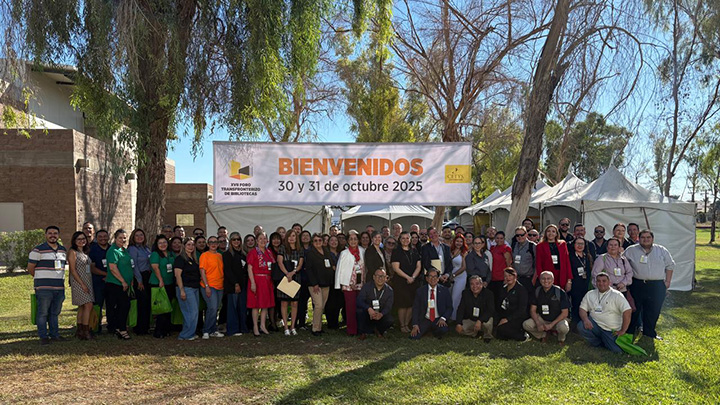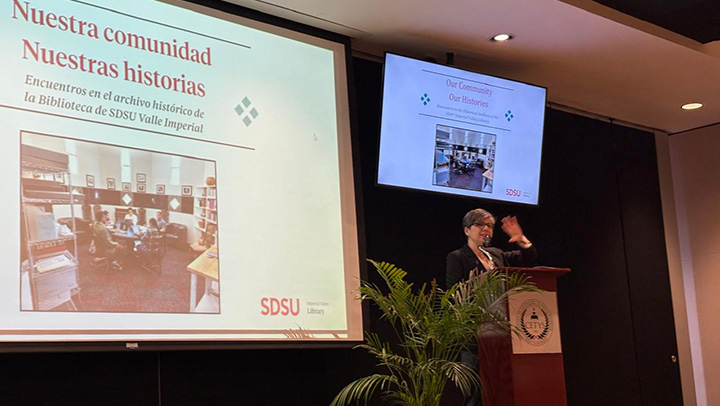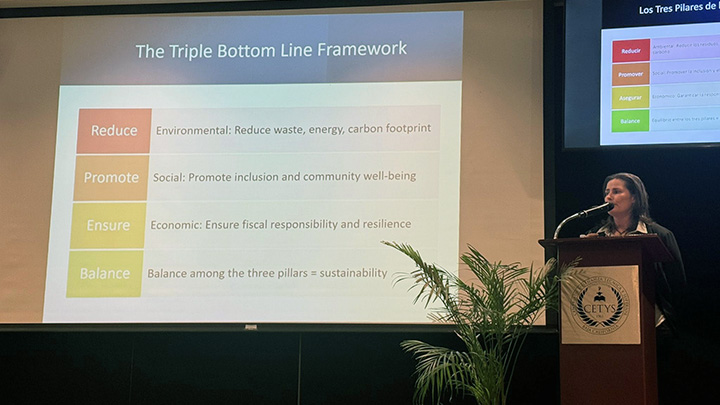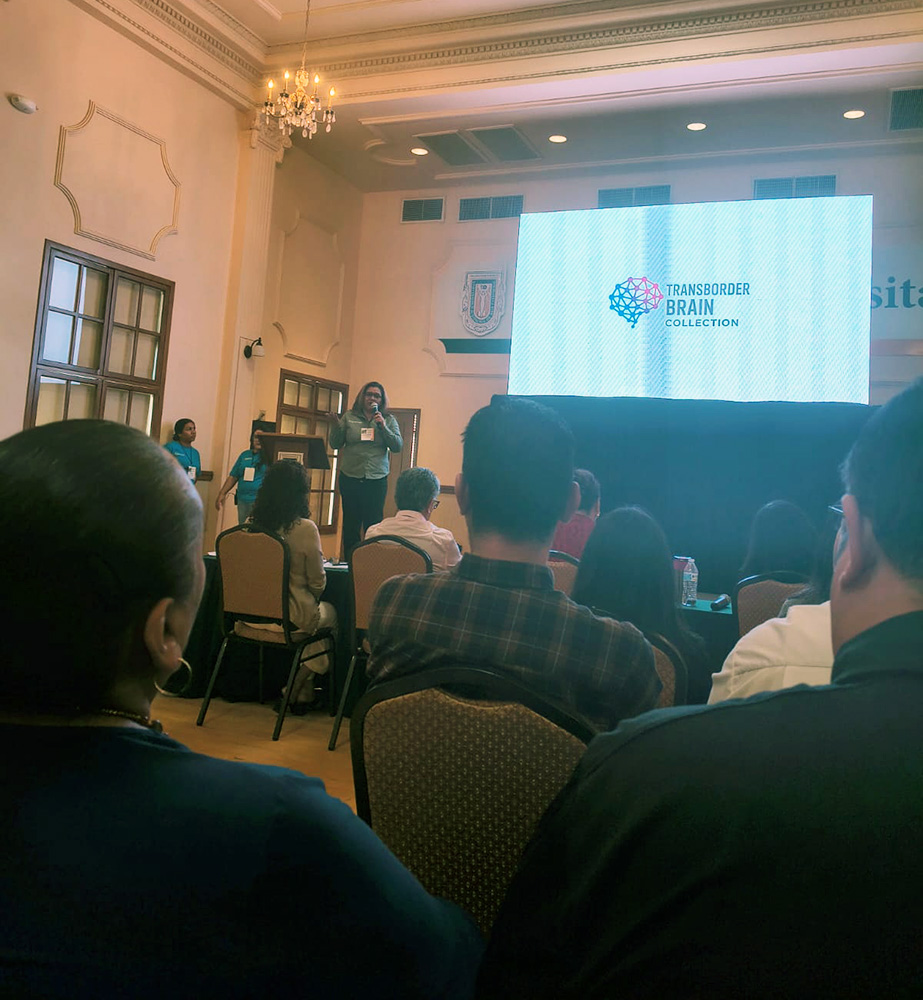SDSU Librarians Collaborate With Mexican Colleagues In Transborder Scholarly Conferences

Last month, three San Diego State University librarians were busy with transborder efforts to encourage and enhance bi-national collaboration and scholarship. As part of International Education Week, we look back on the distinctive contributions that the University Library makes to SDSU’s work as a global university.
The XVII Transborder Library Forum, co-hosted by Centro de Educación Técnica y Superior (CETYS) Universidad Mexicali and the SDSU Library, convened librarians from multiple states in Mexico and the US after a hiatus of more than a decade. Held at CETYS Universidad Mexicali campus on October 30-31, the binational conference was a dedicated space for librarians to share their work and experiences related to the conference theme, "Retomando rumbos y cruzando fronteras, Colaborando en una nueva era / Getting Back on Track and Crossing Borders: Collaborating in a New Era".
Leadership from the CETYS Universidad library administration, in collaboration with Maria Amor, Latin American Language and Cultures Librarian at SDSU, and Armando Robles, Library Campus Coordinator at CETYS, dedicated over a year to preparing the academic program and planning the event. Their successful revival of this scholarly conference brought together librarians from the US Southwest and various states in Mexico, as far away as Tucson, Arizona and Mexico City.
The gathering included presentations from universities and cultural centers, long-time members of the profession, and newer librarians. SDSU Imperial Valley psychology student Mayau Gonazalez shared his experience participating in an SDSU-IV Library history exhibit project led by SDSU Imperial Valley Librarian Mara Cota. Titled “Our People, Our History, Community-Curated Histories from the SDSU Imperial Valley Campus Archival Collections”, the project convened a team of campus community members to investigate and curate artefacts from the SDSU-IV campus history archive and create a permanent exhibit in the library at Calexico. The exhibit is now open and was the focus of Cota’s conference presentation on October 30, “Fomentando encuentros con nuestra historia / Fostering encounters with our history”.

SDSU’s duties as co-host and participants wrapped up on Friday, October 31, with the Keynote Address, “Sustainability in Libraries”, delivered by SDSU Science and Sustainability Librarian Sarah Tribelhorn. This address served as a "call to action" for creating sustainable libraries, emphasizing the importance of building resilient, equitable, and future-ready institutions. Tribelhorn outlined how sustainability aligns with core institutional priorities and enables libraries to lead efforts in addressing environmental, social, and economic challenges. The presentation provided insight into sustainable practices through frameworks like the Sustainable Libraries Certification Program, United Nations’ Sustainable Development Goals, and the Association for the Advancement of Sustainability in Higher Education Sustainability Tracking, Assessment & Rating System. These frameworks offer a structured pathway to success, enhanced community resilience, and embed ethical, social, and fiscal responsibility, which is crucial as sustainability positions libraries as leaders and innovators.

Tribelhorn’s work in evaluation and framework development for libraries provided colleagues with practical tools to further their own work. It was a fitting conclusion to the conference, underscoring many of the themes that conference presenters and attendees discussed over the two-day meeting: the importance of collaboration, dedication to and involvement of our communities, innovative practices scaled to the capacity of each library, and commitment to sustaining the indispensable work of libraries. The Transborder Forum on Libraries was a success and made its own case for carrying on the tradition.
“The 17th Cross-Border Library Forum demonstrated the need and desire for exchanges between librarians on both sides of the border to share ideas, projects, and experiences for the benefit of their communities, which share strong historical ties that go beyond temporary circumstances,” said Daniel Jorge Sanabria Barrios, State Director of Libraries, CETYS Universidad.
The day before the Transborder Library Forum, Amor and UABC Head of the Department of Library Services Mariana Becerra, presented “Transborder Binational Research and Academic Information Network Collection: Transborder BRAIN,” at the RE:BORDER 2025 Conference.
RE:BORDER is a joint project of SDSU and Universidad Autonoma de Baja California. This year’s conference was hosted on UABC’s Mexicali campus, embracing the theme “Sustainable Communities,” which was inspired by potential lithium development that could transform the Imperial County/Mexicali region. The event featured 18 panels investigating topics including binational education, resource sharing, borderlands health and wellness, and sustainable development, and attracted more than 500 participants.

One of RE:BORDER’s marquee events is the Think Tank Quick Pitch Competition. The goal is to jumpstart cross-border collaborations that can grow and potentially attract additional donors. In true transborder collaboration, Amor and Becerra presented from both sides of the border, with Amor attending virtually from SDSU and Becerra presenting in person.
The Transborder BRAIN initiative, in its pilot phase, aims to establish a centralized electronic repository to collect and organize the scientific output of diverse institutional entities on transborder subjects. Universidad Autónoma de Baja California and SDSU have initiated a collaborative review of the potential for developing a joint collection. This initiative, in addition to promoting and disseminating the knowledge generated through research, represents a critical step in preserving the historical memory of the region.
“The University Library has made transborder partnerships a key component of its strategic plan,” said Library Dean Scott Walter, “and our partnerships with UABC and CETYS complement earlier work we have pursued on digital collections with partners in Tijuana and Oaxaca We look forward to continuing to build these partnerships and to expand these programs as part of the library’s contributions to the SDSU goal of breaking new ground as a global institution and "a new kind of HSI.”

